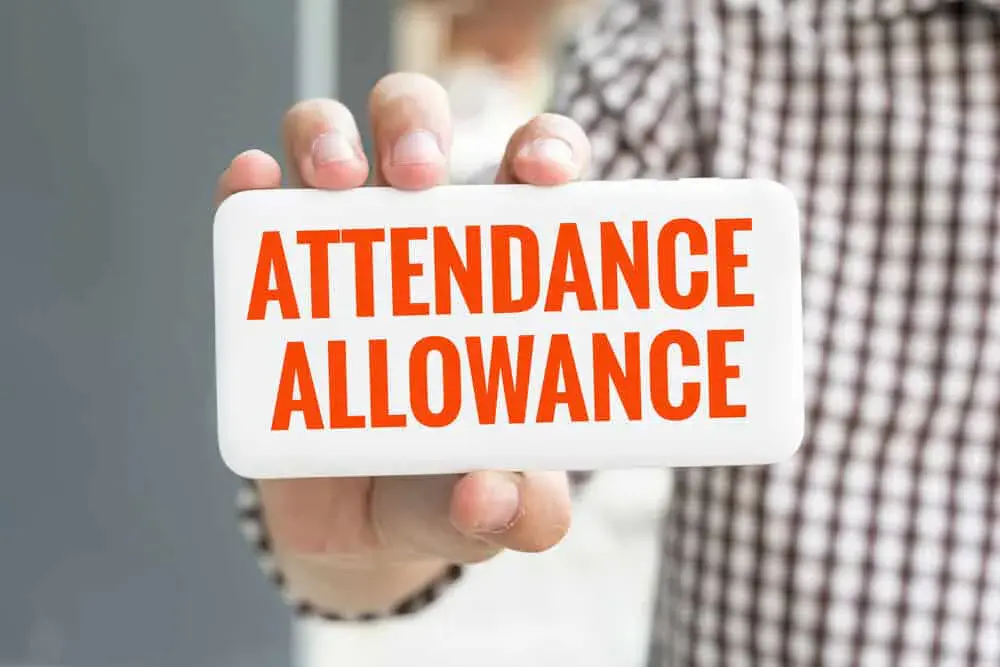Attendance Allowance in a Care Home: Can You Claim?

Estimated Reading Time: 10 minutes
This article was reviewed by Sara Chapin, Director of Finance at Lottie, on 6th December 2024, to ensure accurate and trustworthy information for care seekers. Sara Chapin has been a Certified Public Accountant with the National Association of State Boards of Accountancy since 2017. Next review due December 2025.
There are several care home benefits that can be claimed by UK residents and one of the most common is Attendance Allowance. Here, we’ve explained how Attendance Allowance works in a care home and whether you can get it.
This benefit is available to people who have reached the State Pension age and have a physical or mental disability which means they need extra care and support.
If eligible, you’ll either get £73.90 (the lower rate) or £110.40 (the higher rate) each week. Which rate you qualify for depends on how much care and support you require.
Browse recommended local homes
Compare care homes with availability near you.
In this article on Attendance Allowance in care homes:
- What is Attendance Allowance?
- Can you claim Attendance Allowance in a care home?
- Attendance Allowance rates for 2025/2026
- How is Attendance Allowance paid?
- How does Attendance Allowance work alongside other benefits?
- Attendance Allowance for the terminally ill
- Check your eligibility for Attendance Allowance
- Make a claim
What Is Attendance Allowance?
Attendance Allowance is a benefit for people who have reached the State Pension age and have a disability which means they need additional care and support on a daily basis.
This additional care could include getting dressed or undressed, using the toilet and other forms of personal care.
Any type of disability or illness could make you eligible for Attendance Allowance, provided it affects you on a daily basis and means you need additional support.
However, Attendance Allowance doesn’t cover people with mobility difficulties or needs.
For detailed information about how to claim, how long the form will take to complete and whether your application has been successful or not, download our Attendance Allowance guide, written by our Lead Care Expert Hannah Karim.
Can You Claim Attendance Allowance In A Care Home?
You can get Attendance Allowance at either rate (£110.40 or £73.90 a week) in a care home if you pay for your own care.
However, if your care is paid for by your local authority, your Attendance Allowance will stop 28 days after you enter a care home.
If you live in a nursing home and the NHS pays towards your care through NHS-funded nursing care, you can receive this while also getting Attendance Allowance.

We’re here to help you find the right care home for you or your loved one. You can request a free list of care homes from our Care Experts, who will then share homes matching your budget, location and type of care needed. You can also search for care through our easy-to-use directory.
Attendance Allowance Rates For 2025/2026
Attendance Allowance is comprised of two different rates. How much Attendance Allowance you receive depends on the following:
- How much difficulty you have on a daily basis
- How much care or supervision you require (such as personal care)
- Whether you need help during the day, at night or both
These two rates are:
- Higher rate - If you need frequent care or supervision during the day and at night, or you have a terminal illness
- Lower rate - If you need frequent care or supervision during the day or at night
Here are the Attendance Allowance rates for 2025/2026, along with how much they’ve increased since 2024/2025:
| Rate | Weekly Amount (2025/2026) | Weekly Amount (2024/2025) | Annual Increase |
|---|---|---|---|
| Higher Rate | £110.40 | £108.55 | £1.85 |
| Lower Rate | £73.90 | £72.65 | £1.25 |
The 2025/2026 higher rate of Attendance Allowance has increased to £110.40 per week, and the lower rate has increased to £73.90 per week. Each year, you could receive £5,740.80 for the higher rate and £3,842.80 for the lower rate.
How Is Attendance Allowance Paid?
Attendance Allowance will be paid straight into your bank or building society account every four weeks.
This money can be spent however you wish, such as to help you remain independent in your own home for longer.
Attendance Allowance is usually paid for a minimum of six months. This could be longer if you still have extra care needs after this point.
How Does Attendance Allowance Work Alongside Other Benefits?
Claiming Attendance Allowance won’t negatively affect any other benefits you currently receive (or may receive in the future). In some cases, receiving Attendance Allowance could even make you eligible to earn more from other benefits.
It’s important to be aware that your local authority may class your Attendance Allowance as a form of income when working out whether you’re eligible for care home funding during your financial assessment for care fees.

Attendance Allowance For The Terminally Ill
If you have a terminal illness, you’ll also be able to claim Attendance Allowance. Unlike other claimants, you won’t have to wait six months. Instead, you’ll be able to claim it straight away. This includes people who are currently living in a hospice or are receiving hospice care.
There’s also a special application process which operates at a quicker pace than usual. If you’re unsure, speak to an adviser, such as those at Citizens Advice.
Check Your Eligibility For Attendance Allowance
To be eligible for Attendance Allowance, the following need to apply:
You have a long-term physical or mental disability. There are numerous conditions that could qualify for Attendance Allowance, covering a wide range of disabilities and illnesses, such as sight and hearing impairments, mobility issues, neurological conditions (such as Parkinson's disease), and cognitive impairments (such as dementia)
You need care and support or supervision as a result of this disability (such as help with washing, getting dressed, and taking medications), and you’ll have needed this support for at least six months
You’ve reached the State Pension age (this is currently 66 for men and women in the UK)
You need to have had this condition for at least six months. The only exception to this is if you have a terminal illness.
To be eligible for the lower rate (£73.90 a week), you’ll require regular help or constant supervision during the day, or some supervision at night. To be eligible for the higher rate (£110.40 a week), you’ll require help or supervision throughout the day and at night (or a medical professional has said you may have six months or less to live). You'll have needed help for at least six months.
The number of different medical conditions above means a large number of people are eligible for this benefit in the UK. According to the DWP, just over 1,700,000 in the UK currently claim it. Many people don’t claim though - or they claim the lower rate when they’re actually eligible for the higher rate (there are two different Attendance Allowance rates).
It was estimated by the National Audit Office that around £230 million was unclaimed because claimants don’t know which rate they’re eligible for.
Make A Claim
You can apply by filling in the Attendance Allowance Claim form. This link also includes notes on how to fill in the claim form. Alternatively, you can contact the Attendance Allowance helpline and ask them for a pack, or for advice with filling it out.
This is the information you’ll need when filling in the Attendance Allowance claim form:
- The details of your GP (you might also need appointment letters or a diagnosis from your GP or another healthcare professional)
- National Insurance number
- A list of any prescriptions or medications you receive
- A hospital number (if relevant) and details surrounding any hospital stays you’ve had
You might also need to provide:
- A care plan created by your local council
- Reports from an occupational therapist explaining the equipment and home adaptations needed for you to continue living there safely
Once done, send the completed form to: Freepost DWP Attendance Allowance.
You’ll then hear back from the Department for Work and Pensions (DWP) explaining whether you’ve been approved for Attendance Allowance, and at what rate you’ll receive. If eligible, Attendance Allowance can be paid from the date on which your claim began.
If you live in a care home and self-fund your care, the claiming process will work in the same way.
To make applying easier and to learn the information you'll need to provide, download our Attendance Allowance guide and checklist, written by our Lead Care Expert Hannah Karim.
Attendance Allowance pitfalls and mistakes to avoid
It’s estimated that around 60% of Attendance Allowance applications are rejected. Applicants are most commonly rejected due to things like not stating the specific issues or symptoms that affect them, or not being clear enough with how significant their condition is, or the effect it has on their day-to-day life. Here are common mistakes to avoid when applying for this benefit:
Withholding information - When it comes to claiming Attendance Allowance, you must be accurate and specific as to why you or your loved one require it, including things like your medical condition, whether you’ve had any accidents or falls (and the effect of these), how often support is required, whether your disability or health condition make particular tasks difficult, and whether you receive personal care or supervision during the day.
Exaggerating or understating your needs - Not being truthful about the exact nature of your needs will likely work against you when a decision is made about your eligibility. The same applies to many other similar benefits, including carer benefits.
Not reapplying if your circumstances have changed - Attendance Allowance claims are usually reviewed every 12 or so months to recheck for eligibility. This means if your or your loved one’s initial application was rejected, you can always apply again. This is particularly true if your circumstances have changed since you originally applied.
Not applying based on your financial situation - Attendance Allowance isn’t means-tested and doesn’t require a financial assessment. So, you’ll be eligible, regardless of how high or low your income is. Similarly, it isn’t affected by your savings, or whereabouts in the UK you or your loved one live. You also don’t pay council tax on it.
Exaggerating or understating your needs - Not being truthful about the exact nature of your needs will likely work against you when a decision is made about your eligibility. The same applies to many other similar benefits, including carer benefits.
Not applying because you have a carer - Many people don’t realise you’re eligible to apply for Attendance Allowance, regardless of whether or not you have a carer.
Explore The UK’s Best Care Homes:
Use Lottie to find the best care homes in the UK by price, the care types available, facilities, activities and more:
Can you claim Attendance Allowance and NHS-Funded Nursing Care?
Receiving NHS-Funded Nursing Care (FNC) doesn’t affect your eligibility for other benefits such as Attendance Allowance. This means you can have your care paid through NHS FNC and still claim Attendance Allowance.
Does Attendance Allowance have to be spent on care?
The money you receive from Attendance Allowance doesn’t have to be spent on care.
Are Attendance Allowance rates reviewed if care needs change?
If your loved one receives the lower rate of Attendance Allowance but their care needs have increased, they can contact the Department for Work and Pensions (DWP) via the Attendance Allowance helpline - 0800 731 0122 - rather than having to go through all the paperwork again.
What conditions automatically qualify you for Attendance Allowance?
There are no conditions that automatically qualify you for Attendance Allowance. Instead, you need to have required care or supervision for at least six months because of this condition or disability. You can also apply without your condition being formally diagnosed.
Do you need medical evidence for Attendance Allowance?
You can claim Attendance Allowance without having a formal diagnosis, though you may be medically examined before having your claim approved.
The main thing is that you’ve required help or supervision - or have had difficulties - for at least six months because of your condition. The only exception is if you’re terminally ill.
When applying, you’ll need to provide documentation such as your National Insurance number, driving licence, passport or birth certificate.
Do you need a doctor’s letter to claim Attendance Allowance?
You don’t need a doctor’s letter or a precise diagnosis to apply for and claim Attendance Allowance. What’s important is that you’ve experienced difficulties or required assistance for at least six months because of your condition.
However, when applying, being able to provide evidence such as a doctor’s letter may make your claim more likely to be approved.
What else am I entitled to if I get Attendance Allowance?
If you receive Attendance Allowance, you may also be entitled to extra benefits and payments such as Pension Credit, Housing Benefit, a Council Tax Reduction and help with health costs.
Is Attendance Allowance awarded for life?
If you’re awarded Attendance Allowance, this will last a minimum of six months, but can also be awarded indefinitely. In this case, you won’t need to renew your claim, but your eligibility will still be periodically rechecked (this often takes place on an annual basis).
Free Care Fees & Funding Email Course
Written by our team of experts and designed to help families fund later life care in England.




